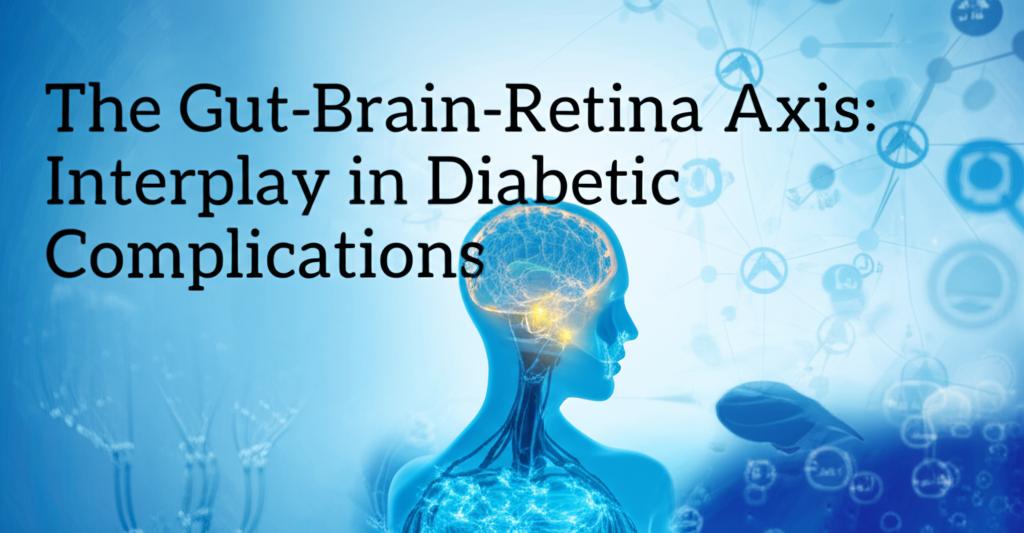The intricate relationship between the gut, brain, and retina, often referred to as the gut-brain-retina axis, is increasingly recognized for its significant role in the development and progression of diabetic complications. This complex interplay involves the gut microbiota, a vast community of microorganisms residing in the digestive tract, which influences systemic inflammation, immune responses, and metabolic processes. Disruptions in this microbial balance, known as dysbiosis, are commonly observed in individuals with diabetes and are implicated in the pathogenesis of diabetic retinopathy, neuropathy, and potentially cognitive impairment.
Gut Microbiota and Diabetic Retinopathy:Diabetic retinopathy (DR), a leading cause of blindness in working-age adults, is a common microvascular complication of diabetes. Emerging evidence strongly suggests a connection between gut dysbiosis and DR through the "gut-retina axis."
- Inflammation and Immune Dysregulation: Gut dysbiosis in diabetic patients can lead to increased intestinal permeability, sometimes called a "leaky gut." This allows bacterial components, such as lipopolysaccharides (LPS), to enter the bloodstream, triggering systemic inflammation. This chronic low-grade inflammation can impact the delicate retinal microvasculature, contributing to blood-retinal barrier breakdown, vascular leakage, and neovascularization – hallmarks of DR. Specific inflammatory cytokines like TNF-α, IL-1β, and IL-6, often elevated due to gut dysbiosis, are implicated in retinal damage.
- Microbial Metabolites: The gut microbiota produces various metabolites that can exert both beneficial and detrimental effects. Short-chain fatty acids (SCFAs), such as butyrate, are generally considered protective, playing a role in maintaining gut barrier integrity and possessing anti-inflammatory properties. A reduction in SCFA-producing bacteria is often observed in diabetes and DR. Conversely, other metabolites, like trimethylamine N-oxide (TMAO), have been associated with increased vascular inflammation and may contribute to DR progression.
- Neurodegeneration: Neurodegeneration is an early event in DR, sometimes occurring even before visible microvascular changes. The gut microbiota has been shown to influence retinal neurodegeneration, potentially through inflammatory pathways and alterations in essential nutrients or neurotrophic factors.
- Oxidative Stress: Dysbiosis can contribute to increased oxidative stress, a key factor in the development of DR. Changes in the gut microbiota can affect the body's antioxidant capacity, leading to an imbalance that promotes retinal cell damage.
The retina is an extension of the central nervous system (CNS), making the gut-brain axis highly relevant to retinal health. Communication between the gut and brain is bidirectional, involving neural, endocrine, and immune pathways.
- Enteric Nervous System (ENS): The ENS, often called the "second brain," lines the gastrointestinal tract and directly interacts with the gut microbiota. Alterations in the ENS, influenced by dysbiosis and inflammation, can impact gut motility, barrier function, and signaling to the brain.
- Hypothalamic Regulation: The hypothalamus, a key brain region for regulating energy balance and glucose metabolism, is influenced by signals from the gut. Dysfunctional gut-brain communication in diabetes can exacerbate hyperglycemia and insulin resistance, indirectly affecting retinal health.
- Cognitive Impairment: Diabetic encephalopathy, characterized by progressive cognitive dysfunction, is another serious complication. The microbiota-gut-brain axis is increasingly implicated in modulating cognitive function. Gut dysbiosis, inflammation, and altered microbial metabolites can contribute to neuroinflammation and an increased risk of cognitive decline in diabetic individuals.
The growing understanding of the gut-brain-retina axis opens new avenues for preventing and treating diabetic complications.
- Probiotics and Prebiotics: Modulating the gut microbiota through probiotics (live beneficial bacteria) and prebiotics (substances that promote the growth of beneficial bacteria) is a promising strategy. Studies have explored their potential to improve glycemic control, reduce inflammation, and potentially mitigate DR.
- Fecal Microbiota Transplantation (FMT): FMT involves transferring fecal matter from a healthy donor to a recipient to restore a balanced gut microbiome. While still an emerging area, FMT is being investigated for its potential in managing metabolic disorders, including diabetes and its complications.
- Dietary Interventions: Diet significantly influences the composition and function of the gut microbiota. Dietary changes aimed at promoting a healthy microbiome, such as increasing fiber intake and reducing processed foods, may be beneficial.
- Lifestyle Modifications: Beyond diet, other lifestyle factors like exercise can also positively impact the gut microbiota and overall metabolic health.
- Pharmacological Targets: Research is ongoing to identify specific microbial pathways and metabolites that could be targeted pharmacologically to protect against diabetic complications.
While evidence for the gut-brain-retina axis in diabetic complications is mounting, further research is needed to fully elucidate the complex mechanisms involved. Longitudinal studies are crucial to understand the causal relationships and to identify specific microbial signatures that predict the risk and progression of these complications. Developing personalized approaches to microbiota modulation based on an individual's unique microbial profile holds significant promise for the future management of diabetes and its devastating consequences on the brain and retina. Recognizing the interconnectedness of these systems provides a more holistic understanding of diabetic pathology and highlights the gut microbiota as a critical therapeutic target.

